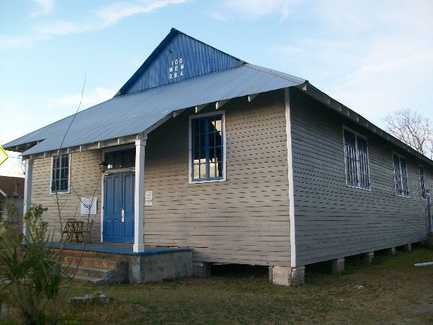BAY ST. LOUIS – On Friday, June 17, a social club on the coast dating back to the 1920s, simply known as “The Hall,” will take its place in the annals of Blues history. In a ceremony beginning at 5 p.m., The 100 Men D.B.A. Hall will join the list of sites recognized on the Mississippi Blues Trail. The marker unveiling will take place at 303 Union Street in Bay St. Louis.
After a brief ceremony, the Homemade Jamz Blues Band is slated to perform as well as the St. Rose de Lima’s Children’s Choir and other local artists.
The 100 Men D.B.A. Hall is a a longtime center of African-American social life and entertainment and it was built by the One Hundred Members’ Debating Benevolent Association in 1922. The organization itself was incorporated in 1894.
Over the years, the association sponsored many events and also rented the hall to promoters who brought in blues, jazz and rhythm & blues acts.
Many local residents recall performances at the Hall by the legendary Etta James, Big Joe Turner, Guitar Slim, Irma Thomas, Professor Longhair, Ernie K-Doe, Deacon John, Earl King, and countless others.
According to the Mississippi Development Authority (MDA), in the decades following the American Civil War, African-Americans throughout the South formed many fraternal and benevolent organizations in order to collectively increase their social, economic and political power.
The One Hundred Members’ Debating Benevolent Association was incorporated in Bay St. Louis in 1894.
According to its charter, “the object and purpose of this Association is to assist its members when sick and bury its dead in a respectable manner and to knit friendship.” The charter stipulated that “the Association may from time to time give entertainments for the purpose of replenishing the treasury.”
Despite its name, the association was founded by twelve men, and the nature of its “debates” appears to be lost. (In other organizations, the initials D.B.A. often stood for Death and Burial Association.)
The MDA said by the 1950s, the functions of many benevolent organizations were supplanted by insurance companies. The Disabled American Veterans acquired the 100 Men D.B.A Hall in the mid-1970s. In 2006, Jesse and Kerrie Loya purchased and restored the hall with the intent of creating a nonprofit community center and venue.
As a resort community in the early decades of the 20th century, Bay St. Louis hosted performances by New Orleans jazz and dance bands, as well as local groups, including the Supreme Band and bands led by Paul Maurice, August Saucier and Harry Fairconnetue. Bay St. Louis natives Fairconnetue and Warren Bennett also worked in Clarence Desdune’s Joyland Revelers.
Other local performers of the era included the Alexis family (Peter, Ricard and Joseph), Edgar Benoit, Sumner Labat, Edward Palloade, Edgar Saucier, Oscar Collins, Eddie Thomas, Anderson Edwards and Johnny Toncred. Famed New Orleans musicians Lorenzo Tio, Sr., and Jr., and Johnny and Warren “Baby” Dodds also lived in this area in the early 1900s.
After World War II the 100 Men D.B.A. Hall became a stop on the “chitlin circuit,” a network of African-American clubs, with many of the acts booked out of New Orleans. Mississippi coast bands, including M. C. Spencer & the Blue Flames, the Sounds of Soul, Carl Gates & the Decks and the Claudetts, also played the 100 Men D.B.A. Hall.
Another area venue in the early 1950s was the Cotton Club on Highway 90, operated by guitarist Jimmy Liggins, who relocated to Mississippi from Los Angeles. One-time area residents who later achieved musical fame included the Bihari family, whose sons formed one of the most important independent record companies, Modern Records, in Los Angeles, and singer-guitarist Ted Hawkins, who was born in Lakeshore.
With over 130 markers, the Mississippi Blues Trail is a museum without walls taking visitors on a musical history journey through Mississippi and beyond. The trail started with the first official marker in Holly Ridge, the resting place of the blues guitarist Charley Patton, and winds its way to sites honoring B.B. King, Muddy Waters, Son House and others.
Out-of-state markers are located in Chicago; Memphis; Los Angeles; Muscle Shoals, Alabama; Ferriday, Louisiana; Helena, Arkansas; Rockland, Maine; Grafton, Wisconsin; and Tallahassee, Florida.


Be the first to comment